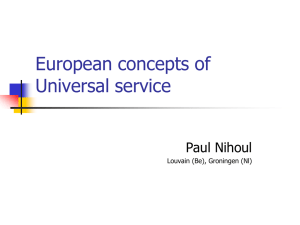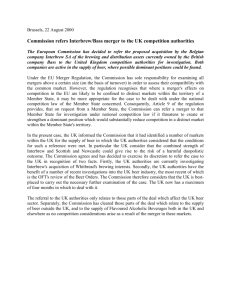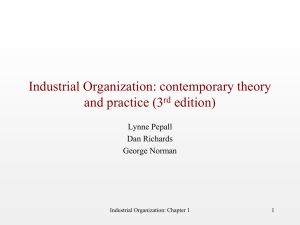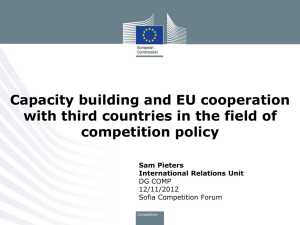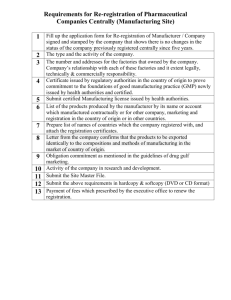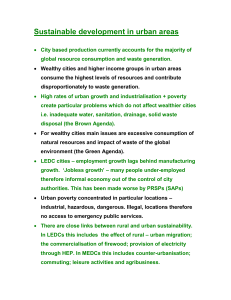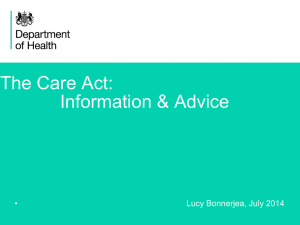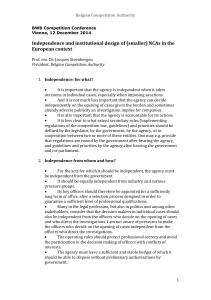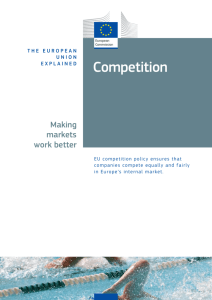DOC - Europa
advertisement
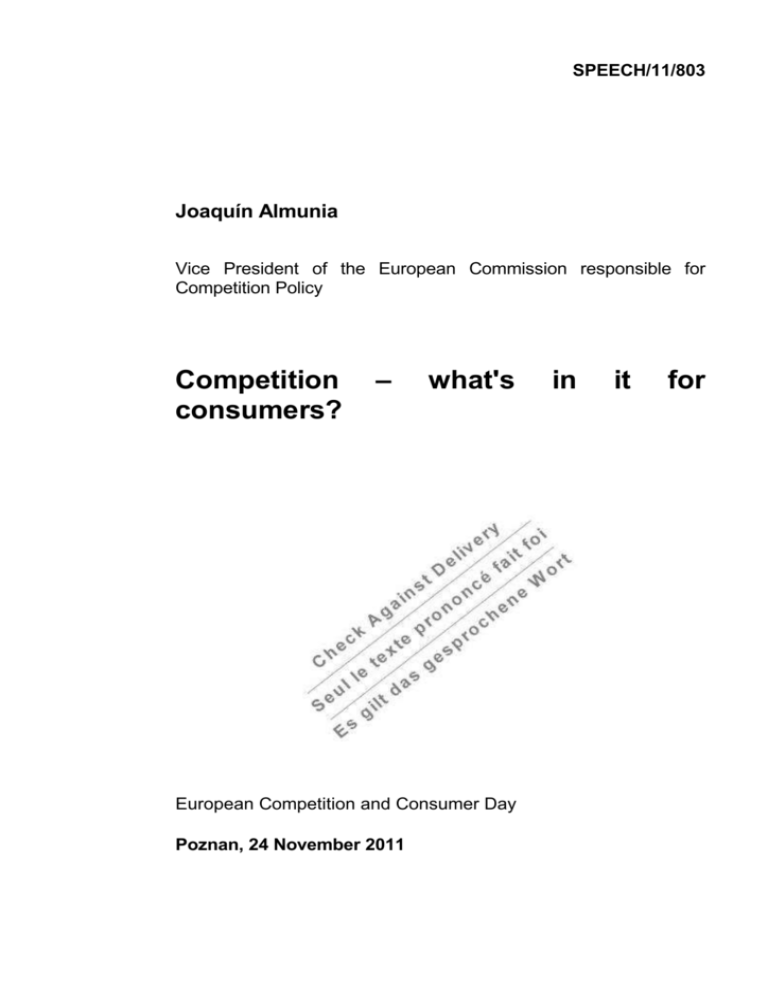
SPEECH/11/803 Joaquín Almunia Vice President of the European Commission responsible for Competition Policy Competition consumers? – what's European Competition and Consumer Day Poznan, 24 November 2011 in it for Ladies and Gentlemen, I would like to thank the President of the Polish Competition and Consumer Office, Ms. Krasnodebska, for inviting me here today. The Competition and Consumer Office should be commended for its excellent track record in applying EU and domestic competition law, with a particular mention for the numerous complex merger cases you dealt with this year. You have also been vigilant in key sectors of the economy that are close to consumers, and the decision you adopted yesterday on the mobile phone operator cartel is a telling example of this. You continue to be actively involved in the European Competition Network and I thank you for your commitment. I would also like to take this opportunity to warmly congratulate the Polish Presidency of the EU for the excellent work done during this semester. I know from my own experience – having been a member of the Spanish Government during our first Presidency in 1989 – how challenging it is to prepare and manage such a great task without a previous experience. You fully succeeded, and all the Europeans will indeed recognise it. Even if Poland is perhaps the economy that has best dealt with the crisis, we are living in difficult times and the economic outlook is uncertain. The effects of this enduring crisis are being felt by people across Europe with increasing intensity. Against this backdrop, how can competition policy help overcome the crisis and put our economies back on a sustainable path? I have heard some voices in the last couple of years say that in times of crisis we should be more lenient in our competition law enforcement, that we should close our eyes on certain anticompetitive practices, that we should allow more State aid to be granted, on more generous conditions. These opinions are simply wrong. In these difficult times, we need more, not less competition in Europe. We need more Europe, not less, also in this field. Competition encourages firms to come up with innovative products and services; offer better quality and a wider choice to consumers. Competition leads to job creation and stimulates growth. Competition policy is also a key instrument to protect and deepen our Single Market. Our ability to guarantee the integrity of the Single Market is important both in economic and political terms: Economically, because the Single Market remains our most important asset and the main engine of our recovery. Politically, because the people can touch with their hands what Europe can do for them – and now it is more important than ever to bring the EU and its institutions closer to the citizens. However, the purpose of competition policy cannot be understood merely from a technical standpoint. 2 In our daily work, we use instruments that require high levels of expertise and the knowledge of the best legal and economic experts. Fortunately, we have that. But these are the just means of our work; the ends – our ultimate goal – is protecting the interests of our fellow European citizens. We work for them in all our cases and policy initiatives. For these reasons, if you ask – as this conference does – "what's in it for consumers", my answer is: "plenty". One only has to look at some of the cases we’ve had in the last few years: we have broken up consumer goods cartels such as in bathroom fittings and detergents; been active in the energy sector – recently in cases such as ENI, RWE and EON – to ensure that the opening of the electricity and gas markets brings real benefits to the consumers; we have acted to give consumers a wider choice of products and services in the digital arena – take for example the broader choice in web browsers that consumers have after our Microsoft case. And there are many other examples that I will come to in a second. Today, I would like to start by explaining what we mean by “consumer welfare” in competition control. I will then look at more concrete examples of how our work helps keep markets open and how it can foster innovation and growth. What is consumer welfare? The facts Consumer welfare is not just a catchy phrase. It is the cornerstone, the guiding principle of EU competition policy. In all our cases we start by looking at the likelihood of "harm" to consumers. What we want to know is to what extent the merger, agreement or practice in question can reduce choice, increase prices or stifle innovation. By pursuing our objective of protecting consumers, we are also in fact promoting those firms that can offer competitive and innovative products and services to them, at all levels of the value chain. In addition, the discipline imposed by competition rules pushes our companies to increase their competitiveness. By imposing this discipline at home, in national markets or in the Single Market, we ensure that our firms are better equipped to take on their competitors on world markets. Understandably, not all our cases deal with consumer products. We often look at intermediate markets – involving raw materials or essential inputs – where the "consumers" are corporate customers seeking competitive conditions of supply. But the competitiveness of these firms, and in particular SMEs, is also essential for "consumer welfare" and our economy. I would like to make one point clear here: the role of competition authorities is not to deliver these benefits directly to consumers, but to create the best conditions for a well-functioning market. The Commission, together with National Competition Authorities, do this by ensuring that companies compete rather than collude; that market power is not abused or acquired through anticompetitive mergers; and that – when efficiencies are claimed – they are passed onto customers. 3 Of course, competition tools cannot solve all the problems that consumers may encounter. Confusion is sometimes made between what is covered by EU competition law and what pertains to “consumer protection” legislation on unfair commercial practices and so on. To put it bluntly, we can sanction a company if it abuses its market power to illegally keep efficient competitors out. But we cannot sanction – on the basis of EU competition law – non dominant companies for giving wrong information to their clients. This often pertains to contract or commercial law. Recent examples Now, I would like to give you some recent examples to show what we do for consumers and for the economy as a whole. I will start with examples of our work in sectors of the economy where growth can be easily unleashed, such as the digital economy. As you know, last June the Commission imposed a fine of €127 million on Telekom Polska for abusing its dominant position in Poland. As the dominant national player, Telekom Polska is under an obligation to allow other operators to access its network and wholesale broadband services. However, it consistently refused to do so – or made it impossibly difficult – for more than four years. If competition had not been restricted by the company, in all likelihood consumers would have enjoyed more choice, lower retail prices, and more innovative services. Thanks to our decision, we expect that Polish families will now enjoy these benefits and spend less to use the Internet. Poland, by the way, was not the only country where we had to intervene in the telecoms sector. In Spain, Telefónica was fined €150 million in 2007 for abusing its dominant position and back in 2003 Wanadoo was also fined in France. We are now investigating fresh telecom cases in Spain, Portugal and Slovakia to ensure that consumers get competitive deals across Europe. In this context, I was also pleased to note the recent ruling of the European Court of Justice in the Pierre Fabre cosmetics distribution case, a ruling that supports crossborder sales in the Single Market. The Court pointed out that a ban on internet sales reduces the ability of a distributor to sell to customers outside its territory and is an unacceptable restriction of competition. Limiting a distributors' freedom to sell to a consumer that visited its website is a hardcore restriction of competition law. It denies the very existence of Europe's Single Market and is a pointless battle against what has become a reality, that of a growing online market full of potentialities. We will continue to tackle such violations as stated in the new rules on distribution on the so-called "vertical agreements", adopted last year by the Commission. These rules are designed to promote online sales; at same time, they recognise that a company is free to organise its sales or distribution networks as it sees fit. This is in the best interest of consumers and companies alike. 4 The Pierre Fabre ruling underlines the need for a strict application of Single Market imperatives. I intend to explore all the ways in which competition policy can contribute to this agenda by fighting artificial restrictions imposed by some companies to cross-border trade. This will be particularly important in the digital area where I have already started to look at the distribution practices of certain products such as e-books. In another recent ruling, concerning the sale of TV rights in the Premier League case, the Court took a strong stance against the artificial partitioning of the Single Market. The Court ruled that such partitioning broke competition rules and hindered the freedom to provide services throughout the EU. This should be good news for football lovers watching their favourite teams across Europe. Such rulings strike at the heart of the problems that Europe faces in completing its Single Market and they certainly guide us in our work. Another story related to the digital economy is the decision that we adopted yesterday on the proposed acquisition by Western Digital of the hard disk drive business of Hitachi. In its original form, the merger would have lowered competition by creating a duopoly in the global markets of Hard Disk Drives for desktop and consumer electronics. We cleared the deal on condition that Western Digital divests a viable business in these markets. The company promised that it will not complete the merger before it finds a suitable buyer. Thanks to these commitments, at least three suppliers will remain for manufacturers and, ultimately, consumers. The financial sector is another industry where competition control is increasingly important for citizens. A good example of our work here are the commitments we accepted from companies such as Visa, Mastercard and – last week – Standard and Poor's that will improve the efficiency and transparency of European financial markets, making transactions easier for consumers and retailers. In recent years, the Commission has also vigorously enforced antitrust rules in the energy sector. We carried out investigations in the electricity and gas markets that have triggered far-reaching remedies and sometimes, significant sanctions, as for instance in the EON/GDF collusion case. The purpose of all these cases is to allow the final consumer to benefit from lower prices and a wider choice of supply. Such cases will trigger both direct and indirect benefits, as gas and electricity are essential inputs in the production of virtually all consumer goods. After the enlargement of 2004, we have recently opened new investigations in the electricity and gas sectors of some central European countries. Finally, our fight against cartels has also been relentless. Since February 2010, we have taken nine decisions, with a string of cases this year in a variety of markets. 5 These last cartels were perhaps easier to repress thanks to our new settlement tool where the companies acknowledge their cartel behaviour upfront against a reduction in their fine. Well, I think that taken together, all these examples provide an ample answer to the main question of this conference. There should be little doubt as to ‘what’s in it for consumers’. Cooperation: the key to success So far I have focussed on what we do at the competition department of the European Commission, but the power of EU competition law is also that national competition authorities can enforce directly the same articles of the Treaty. This makes a big difference, because often the cases that affect consumers are of national or regional scope. This explains why national authorities are well placed to deal with such cases. There are many achievements at national level. A couple of weeks ago, I met the heads of all the national competition authorities in the EU, including our hosts, who discussed their work in the food sector, where their agencies have been remarkably active. The figures show that national competition authorities have taken some 150 enforcement actions and carried out over 80 sector inquiries, market studies and opinions on this vast sector that is crucial for our populations and economies. These actions covered a wide range of products and sectors at all levels of the supply chain. All these findings will soon be presented in a Report prepared by the European Competition Network. I have taken note of the concerns raised in this sector and I am well aware of its sensitivity in times of crisis. How can consumers help? Before I close, I would like to refer to one intriguing question in today’s programme: “can consumers help”? Again, the answer is ‘yes’. Competition policy is not just a matter for firms, lawyers, economists and experts. First and foremost, competition policy is about welfare for ordinary people. It is designed and implemented to protect the same citizens who are now suffering from the consequences of the crisis in terms of unemployment, loss of purchasing power, and loss of opportunities. We work for them; it is because of them that we fight cartels; that we control mergers; and that, in general, we prevent and repress anticompetitive business practices. But we also need their help. Consumers and consumers’ organisations can help us and national competition authorities carry out our work. I urge everyone, especially consumer organisations, to come forward with factual information that may help our investigations. We always welcome this sort of cooperation when it is accompanied by solid and well researched data. 6 There have been cases of successful cooperation with consumers. For instance, the French mobile telephone operators case of 2005, where the French competition authority fined several companies for agreements that distorted competition in the market. The investigation into one of those agreements had been triggered by a complaint from the consumer association "UFC Que Choisir". So this is something that participants today can reflect on – how consumer groups can better cooperate with competition authorities to help us in our work and encourage the establishment of a competition-friendly culture among Europe’s companies and people. In parallel, we will of course continue to pursue advocacy initiatives to develop a competition culture within companies, including SMEs. The Commission has just published a brochure on business compliance, which will be available on all EU languages and that we will distribute widely. It underscores how important free competition is for businesses to grow and develop and how important it is for companies to adopt a compliant attitude – irrespective of their size. Adopting such a responsible attitude can save a lot of additional costs and maintain a good business reputation. It is also the best way to prevent consumer harm. I would like to close on this note: prevention is always better than the cure. And there is no better prevention than that carried out by the consumers themselves, people who know their rights and who hold companies – large and small – accountable for any breaches of Europe’s competition law. Thank you. 7



